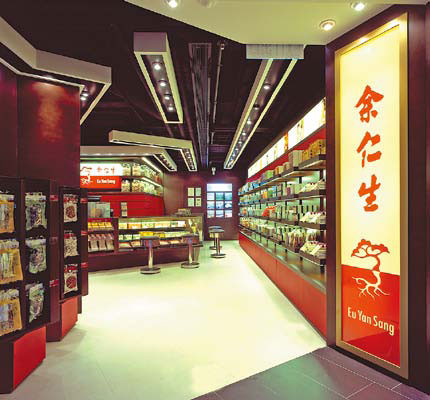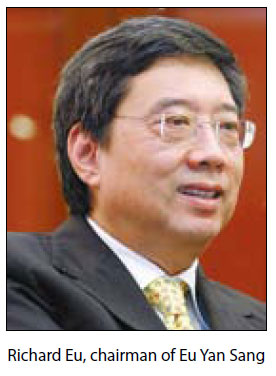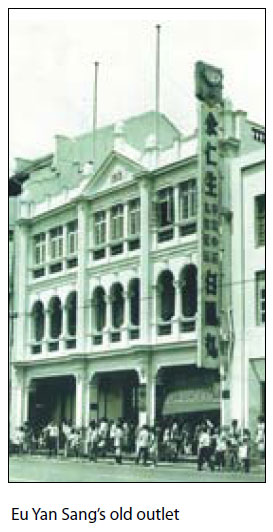Traditional medicine brand breaking into world market
Updated: 2013-09-22 08:00
By Xu Xiao (China Daily)

Eu Yan Sang's outlet on Russell Street in Hong Kong. Photos Provided to China Daily


The time-honored traditional Chinese medicine brand Eu Yan Sang is set on becoming a leader in the global healthcare industry, company Chairman Richard Eu said.
An old Chinese saying goes: "Great men's sons seldom do well". However, the Eu family empire has been passed on through four generations, and the company is still going strong.
In the 1870s, Eu Tong Sen, Richard Eu's great-grandfather, was the Foshan-born owner of a tin ore mine. He provided his opium-addicted workers traditional Chinese medicine and healthcare.
Gradually he found business opportunities in the field of Chinese medicine and established the Eu Yan Sang brand in 1879. Eu is the family name and has remained part of the trademark of the business over generations, while Yan Sang stands for caring and charity in the Chinese language.
When control over the company passed to Richard Eu in 1989, it was just a small chain store, Eu said. At the time it had one outlet in Singapore, one in Hong Kong and five in Malaysia.
Richard found that the only business in the Eu family's empire that carries the family name still had a lot potential to be explored so he decided to take over the company.
The ambitious young man had a comprehensive educational background and extensive work experience. He had a law degree from London University and formerly worked as a banker, a stockbroker, a computer retailer and luxury goods seller.
The first obstacle he had to overcome after taking over the business was how to deal with jealous relatives, who sold their shares in the company.
Rather than viewing this as a setback, Eu used it as an opportunity to purchase back the other stocks shares and integrate the brand as a whole.
By the time the company was listed in 2000, the number of its chain stores had grown to 52.
Fast development has taken place since 1997 despite various risks, including the world financial crisis that broke out in 2008.
Richard said an important reason for Eu Yan Sang's growth during the financial crisis is attributable to the inelastic demand in the healthcare industry.
In healthcare, demand remains constant despite macroeconomic conditions.
"It was the combination of luck and planning," he recalled.
"We learned what is right at the right time (through our expansion from 2003 to 2008)."
The core competitiveness of the brand comes from "its constant pursuit of innovation", Richard said.
Now Eu Yan Sang has more than 300 chain stores and 27 clinics across the globe. In Singapore alone, it has 23.
He said branding is very important for them. In some places of the world, Eu Yan Sang is already a household name, especially for its infant healthcare products.
Industry image
Despite the success of Eu Yan Sang, traditional Chinese medicine still suffers from an image problem in some parts of the world due to an insufficient understanding of the practices involved, Eu said.
He said Western people are confused about traditional Chinese medicine. They hear that some materials are from tigers or bears, which sounds sensational and cruel.
He told reporters that the foremost thing to do is to let more people know what traditional Chinese medicine really is. He said it is not witch doctors making strange potions but rather a type of folk wisdom that has been passed from generation to generation.
He suggested two ways to improve the public image of traditional Chinese medicine.
The first is to strengthen corporate governance and the second is to focus on transparency.
Both require a consistent industry standard, he added.
All of Eu Yan Sang's stores and clinics are directly operated by the company, enabling them to be managed under the same standard.
Chinese entrepreneurs
Richard Eu has his own understanding of what it means to be a successful Chinese entrepreneur.
In Thailand, Chinese entrepreneurs blend in well with local businesspeople, thus it is difficult to tell the difference.
However in Indonesia, the group accounts for a small percentage -about 5 percent. As a minority in these regions, they should be more careful in dealing with local communities, he said.
The situation is different in some Western countries, especially the US and Canada, where quite a lot of Chinese entrepreneurs have been successful.
Eu said these countries have a more open and tolerant culture. Even as a minority, Chinese are getting more and more recognition.
He went on to say that no matter which country or culture Chinese entrepreneurs are doing business in, they should be careful about being a part of the local society.
"Be mindful to avoid being alienated due to cultural differences," he suggested.
"You should find the balance between your own Chinese ethical values and the national culture of the country you are doing business in," he added.
Social responsibility
Though he has received several awards in the industry, Eu keeps a low profile.
"The awards represent many people behind you," he said. "I'm not keen about individual honor."
"As a leader, you are not only responsible to your shareholders but also to the customers, suppliers, government agencies and media," he said.
He said the responsibility of a company is giving back to society.
"I've kept asking my staff to care about the minority groups. Though you may not have money, you can still donate your time," he said.
He noted that his ambition is to help Eu Yan Sang gain more recognition as a leader of the industry.
He aims to triple the current size of the company to expand business to the Chinese mainland and many other places both in the East and West.
Eu said he also wants to raise health awareness by encouraging people to pay more attention to prevention rather than waiting to get sick before visiting the doctor.
"An environmentally friendly and natural lifestyle is the most important," he concluded. He said he hopes his successors can adapt to changing situations because change and innovation maintain the vitality of a brand.
xuxiao@chinadaily.com.cn



 Reply With Quote
Reply With Quote






